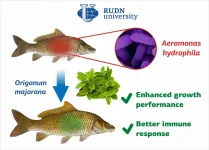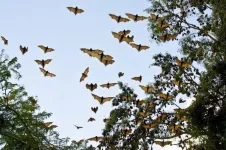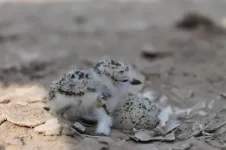Lower risk of brain injury for at-risk infants whose mothers consumed pomegranate juice
Preliminary findings from a randomized controlled trial suggest pomegranate juice may provide neuroprotection in pregnancies with intrauterine growth restriction
2021-03-11
(Press-News.org) Intrauterine growth restriction (IUGR) is common and concerning, but few therapeutic options exist for pregnant mothers who receive this diagnosis. IUGR is a condition in which a baby in the womb is measuring small for its gestational age, often because of issues with the placenta, resulting in compromised or insufficient transfer of oxygen and nutrients to the growing fetus. The developing fetal brain is particularly vulnerable to these effects. One out of every 10 babies is diagnosed with IUGR, and infants with IUGR are at increased risk of death and neurodevelopmental impairment. Recent research on polyphenol-rich pomegranate juice has suggested that it may help protect the brain from injury. In an exploratory, randomized, controlled clinical trial, supported by philanthropic funding and a gift from POM Wonderful, the largest grower and producer of fresh pomegranates and pomegranate juice in the United States, investigators at END
ELSE PRESS RELEASES FROM THIS DATE:
Marjoram supports health and weight gain in carps, say biologist from RUDN University
2021-03-11
Biologists from RUDN University suggested adding a marjoram-based supplement to the diet of common carp to support the growth of the fish and improve their resistance to bacterial infections. The results of the study were published in the Fish & Shellfish Immunology journal.
Cyprinus carpio is a type of large omnivore fish that grows 35-40 cm long in three to five years. 4 mln tons of carps were bred in aquacultural farms in 2010. Such farms protect natural populations of Cyprinus carpio while at the same time satisfying the market demand. However, as farmers strive for higher productivity, aquacultural farms become more and more crowded which leads to the lack of nutrients and harms the health of the fish. A team of veterinarians ...
Study suggests healthy ecosystems are vital in reducing risk of future deadly pandemics
2021-03-11
CABI scientist Dr Arne Witt has shared his expertise on invasive alien plant species as part of a new paper which argues that healthy ecosystems are vital in reducing the risk of future pandemics - such as coronaviruses (including COVID-19) - that threaten human health.
The paper - 'Land use-induced spillover: priority actions for protected and conserved area managers' - is published as part of a special issue by the journal PARKS entitled 'COVID-19 and Protected Areas: Essential Reading for a World Haunted by a Pandemic.'
Lead author Dr Jamie K. Reaser - along with a team of researchers from institutions including the African Wildlife Foundation, the University ...
Does your child have MIS-C, COVID-19 or Kawasaki disease?
2021-03-11
Exposure to SARS-Co-V2, the virus that causes COVID-19, can put otherwise healthy children and adolescents at risk for Multisystem Inflammatory Syndrome in Children (MIS-C), a rare but possibly life-threatening pediatric condition that can cause severe inflammation in organs like the heart, brain, lungs, kidneys and gastrointestinal system.
Diagnosing and treating MIS-C -- which has affected 2,600 children since May 2020 and is known to occur in children who have tested positive for SARS-Co-V2 or been exposed to someone with COVID-19 -- is difficult because respiratory and gastrointestinal symptoms can be similar to severe COVID-19. Other features of MIS-C are very similar to Kawasaki disease, which causes inflammation ...
Rare earths outside China: FAU researchers identify new deposits
2021-03-11
Rare earth elements are the gold of the 21st century: rare and highly prized all over the world. Most known and economically viable sources of rare earths are located in China, where more than 80 percent of them are refined. This has resulted in a near monopoly situation, with China dominating international trade, particularly in heavy rare earths. Geologists and materials scientists at FAU have now discovered a new way of finding new and previously unknown deposits of rare earths, or rare earth metals, worldwide. They have published the findings of their study in the journal Geology.
Rare earth metals are irreplaceable for manufacturing advanced high-tech industrial products due to their luminescent and ...
Wing tags severely impair flight in African Cape Vultures
2021-03-11
Conservationists who apply wing tags for identifying Cape Vultures--a species of African vulture that is vulnerable to extinction--are putting the birds' lives further at risk, a new movement ecology study has shown. Researchers from the Max Planck Institute of Animal Behavior in Germany and VulPro NPC in South Africa have demonstrated that Cape Vultures fitted with tags on their wings travelled shorter distances and flew slower than those fitted with bands around their legs. The research emphasises the importance of investigating the effects that tagging methods can have on the behaviour and conservation of species, prompting a shift towards the ...
Starting small to answer the big questions about photosynthesis
2021-03-11
New scientific techniques are revealing the intricate role that proteins play in photosynthesis.
Despite being discovered almost 300 years ago, photosynthesis still holds many unanswered questions for science, particularly the way that proteins organise themselves to convert sunlight into chemical energy and at the same time, protect plants from too much sunlight.
Now a collaboration between researchers at the University of Leeds and Kobe University in Japan is developing a novel approach to the investigation of photosynthesis.
Using hybrid membranes that mimic natural plant membranes and advanced microscopes, they are opening photosynthesis to nanoscale investigation - the study of life at less than one billionth ...
Female snowy plovers are no bad mothers
2021-03-11
In snowy plovers, females have overcome traditional family stereotypes. They often abandon the family to begin a clutch with a new partner whereas the males continue to care for their young until they are independent. An international team led by scientists from the Max Planck Institute for Ornithology in Seewiesen, Germany, has now investigated the decision-making process that determines the duration of parental care by females. They found that offspring desertion often occurs either under poor environmental conditions, when chicks die despite being cared for by both parents, ...
Tumours illuminated brightly and precisely with new biodegradable nanoprobe
2021-03-11
To highlight tumours in the body for cancer diagnosis, doctors can use tiny optical probes (nanoprobes) that light up when they attach to tumours. These nanoprobes allow doctors to detect the location, shape and size of cancers in the body.
Most nanoprobes are fluorescent; they absorb light of a specific colour, like blue and then emit back light of a different colour, like green. However, as tissues of the human body can emit light as well, distinguishing the nanoprobe light from the background light can be tough and could lead to the wrong interpretation.
Now, researchers at Imperial College London have developed new nanoprobes, named bioharmonophores and patented at Imperial, ...
A new model predicts snakebites to save human lives
2021-03-11
About 1.8 million envenoming snakebites occur around the world annually, killing about 94,000 people. In tropical areas, especially in Southeast Asia and Sub-Saharan Africa, snakebites are considered a major cause of death, especially among farmers who encounter snakes in their fields. In response, the World Health Organization has launched a strategic plan to reduce snakebites by 50% by 2030. An important basis for attaining this goal is expanding relevant scientific research.
An international research group, including researchers from Tel Aviv University, has recently created an innovative simulation model for predicting snakebites, based on an improved ...
Rare VEXAS disease affecting only men is found to be more common than first thought
2021-03-11
A rare disease first identified in 2020 is much more common than first thought, say researchers at the University of Leeds investigating its origins.
VEXAS syndrome is a serious inflammatory condition which develops in men over 50, causing them to become very sick and fatigued, and can be fatal. It was originally thought to be rare, but a new study has identified genetic mutations which indicate that the disease is actually much more common.
The researchers developed a genetic test to identify patients who may have the disease, and now want to screen more people showing symptoms to understand exactly how common it is.
VEXAS syndrome causes unexplained fevers, painful skin rashes and affects the bone ...
LAST 30 PRESS RELEASES:
Nanoplastics can interact with Salmonella to affect food safety, study shows
Eric Moore, M.D., elected to Mayo Clinic Board of Trustees
NYU named “research powerhouse” in new analysis
New polymer materials may offer breakthrough solution for hard-to-remove PFAS in water
Biochar can either curb or boost greenhouse gas emissions depending on soil conditions, new study finds
Nanobiochar emerges as a next generation solution for cleaner water, healthier soils, and resilient ecosystems
Study finds more parents saying ‘No’ to vitamin K, putting babies’ brains at risk
Scientists develop new gut health measure that tracks disease
Rice gene discovery could cut fertiliser use while protecting yields
Jumping ‘DNA parasites’ linked to early stages of tumour formation
Ultra-sensitive CAR T cells provide potential strategy to treat solid tumors
Early Neanderthal-Human interbreeding was strongly sex biased
North American bird declines are widespread and accelerating in agricultural hotspots
Researchers recommend strategies for improved genetic privacy legislation
How birds achieve sweet success
More sensitive cell therapy may be a HIT against solid cancers
Scientists map how aging reshapes cells across the entire mammalian body
Hotspots of accelerated bird decline linked to agricultural activity
How ancient attraction shaped the human genome
NJIT faculty named Senior Members of the National Academy of Inventors
App aids substance use recovery in vulnerable populations
College students nationwide received lifesaving education on sudden cardiac death
Oak Ridge National Laboratory launches the Next-Generation Data Centers Institute
Improved short-term sea level change predictions with better AI training
UAlbany researchers develop new laser technique to test mRNA-based therapeutics
New water-treatment system removes nitrogen, phosphorus from farm tile drainage
Major Canadian study finds strong link between cannabis, anxiety and depression
New discovery of younger Ediacaran biota
Lymphovenous bypass: Potential surgical treatment for Alzheimer's disease?
When safety starts with a text message
[Press-News.org] Lower risk of brain injury for at-risk infants whose mothers consumed pomegranate juicePreliminary findings from a randomized controlled trial suggest pomegranate juice may provide neuroprotection in pregnancies with intrauterine growth restriction





